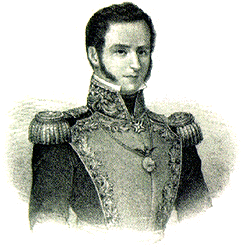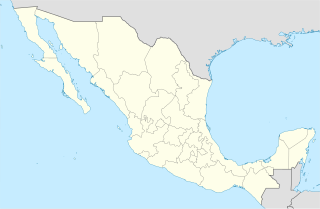
Lázaro Cárdenas del Río was a general in the Constitutionalist Army during the Mexican Revolution and a statesman who served as President of Mexico between 1934 and 1940. He is best known for nationalization of the oil industry in 1938 and the creation of Pemex, the government oil company. He also revived agrarian reform in Mexico, expropriating large landed estates and distributing land to small holders in collective holdings (ejidos).

Pedro Bernardino María de Anaya y de Álvarez was a military officer who served twice as interim president of Mexico from 1847 to 1848. He also played an important role during the Mexican–American War.
Jiquilpan de Juárez is a town of about 15,000 residents in northwest Michoacán, Mexico, near the border with the states of Colima and Jalisco. It is the seat of the municipio of Jiquilpan and the birthplace of President Lázaro Cárdenas (1934–40). The city is home to the Centro de Estudios de la Revolución Mexicana Lázaro Cárdenas and the Instituto Tecnológico de Jiquilpan.

José María de Tornel y Mendívil (1795–1853) was a 19th-century Mexican army general and politician who greatly influenced the career of President Antonio López de Santa Anna.

Lázaro Cárdenas is a port city that with its surrounding municipality is located in the southern part of the Mexican state of Michoacán. It was formerly known as Los Llanitos, but changed its name as a tribute to Lázaro Cárdenas del Río, a Michoacán-born politician who was president of Mexico from 1934 to 1940.
Antonio Alatorre Chávez was a Mexican writer, philologist and translator, famous due to his influential academic essays about Spanish literature, and because of his book Los 1001 años de la lengua española
CBTIS is a chain of Mexican high schools which offers programs to upgrade the regular degree to a technical-professional level. CBTIS has campuses located in 31 states.
José Mancisidor Ortiz was a Mexican writer, historian and politician.
CETIS is a chain of Mexican high schools which offers programs to upgrade the regular degree to a technical-professional level. CETIS has campuses located in 31 states and the Federal District.
María del Rosario Gutiérrez Eskildsen was a Mexican lexicographer, linguist, educator, and poet who is remembered for her studies on the regional peculiarities of speech in her home state of Tabasco as well as for her pioneering work as a teacher and pedagogue in Tabasco and throughout Mexico. She has at times been described as Tabasco's first woman "professionist".
CBTA (Centro de Bachillerato Tecnologico Agropecuario is a chain of Mexican high schools which offers programs to upgrade the regular degree to a technical-professional level. CBTA has campuses in 31 states.
CBTF (Centro de Bachillerato Tecnologico Forestal is a chain of Mexican high schools which offers programs to upgrade the regular degree to a technical-professional level. CBTF has campuses in 4 states.
Centro de Estudios Tecnológicos en Aguas Continentales (CETAC) is a chain of Mexican high schools which offers programs to upgrade the regular degree to a technical-professional level. CETAC has campuses in two States.
CEB is a chain of Mexican high schools which offers programs to upgrade the regular degree to a technical-professional level. It has campuses located in 21 states and in the Federal District.
Preparatoria Federal is a chain of Mexican high schools which offers programs to upgrade the regular degree to a technical-professional level. Preparatoria Federal has campuses located in 22 states.
José Manuel Puig Casauranc was a Mexican politician, diplomat and journalist who served as Secretary of Public Education, Secretary of Industry, Commerce and Labor, Secretary of Foreign Affairs and federal legislator in both the Senate and Chamber of Deputies. As a key adviser to President Plutarco Elías Calles (1924-28), he is credited with drafting Calles's speech to Congress following the assassination of President-elect Alvaro Obregón declaring the end of the age of caudillos and the start of rule of institutions and laws.
Yolanda Cabrera is a Mexican artist who was a graphic designer for twenty years before turning to the fine arts. Her work shows influence from her former profession along with the use of personal symbolism and experimentation in both materials and techniques. Cabrera’s work has been shown regularly in Mexico City and other parts of the country and has been recognized by the Salón de la Plástica Mexicana.
Francisco José Múgica Velázquez was a military revolutionary, Major General and Mexican politician. He participated in the Constitutional Assembly of 1917 that produced the Constitution of Mexico, and was notable for being a radical ideologue. and served governor of the states of Tabasco and Michoacán as well as the then-Territory of Baja California Sur and Islas Marías. Múgica was the ideological mentor to Lázaro Cárdenas following the military phase of the Revolution, and served as member of Cárdenas's cabinet when he was president (1934-40), heading the secretariats of National Economy and Communications and Public Works.





